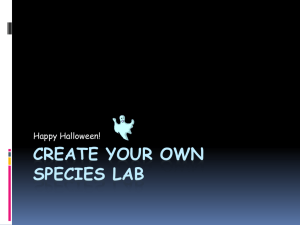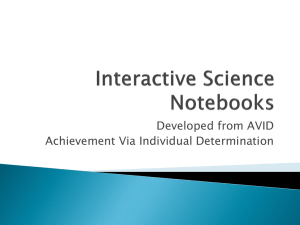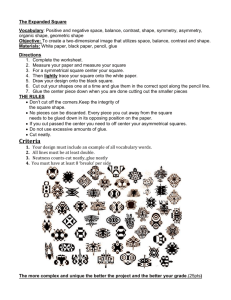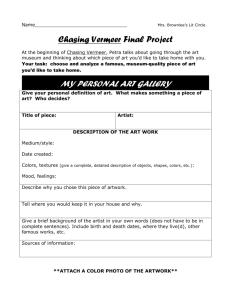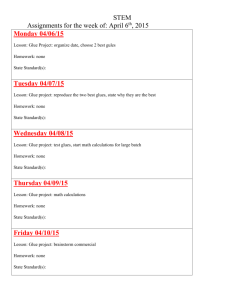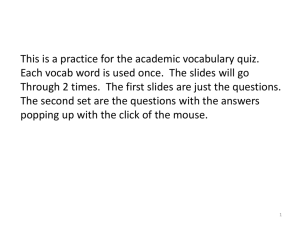Expressive Line Composition
advertisement
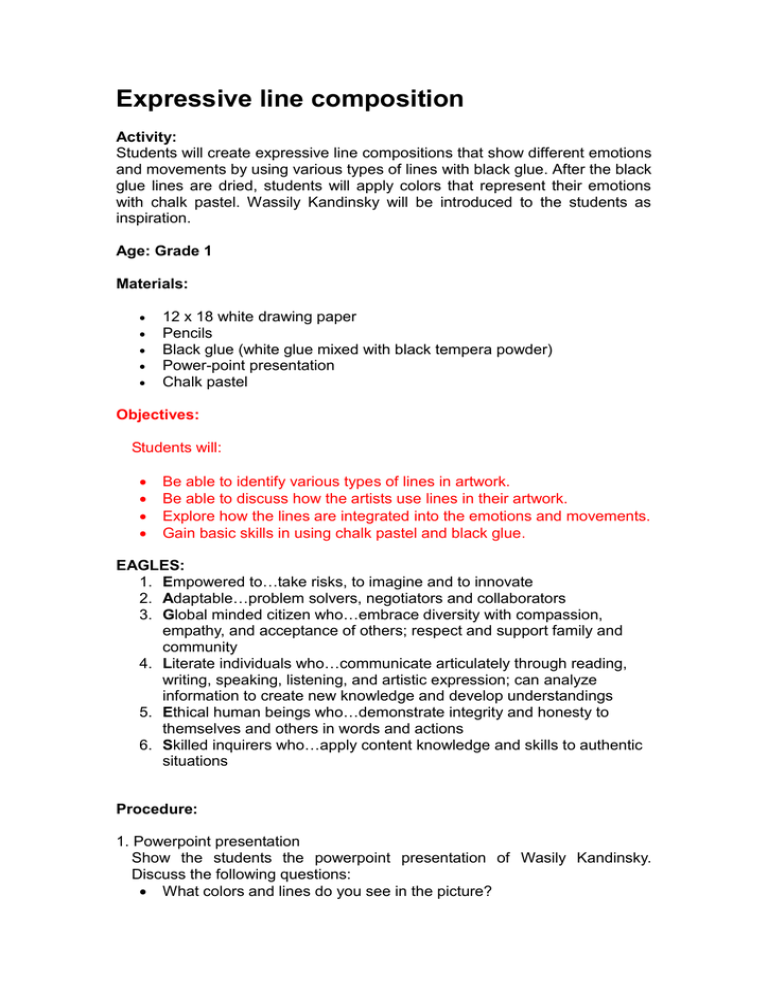
Expressive line composition Activity: Students will create expressive line compositions that show different emotions and movements by using various types of lines with black glue. After the black glue lines are dried, students will apply colors that represent their emotions with chalk pastel. Wassily Kandinsky will be introduced to the students as inspiration. Age: Grade 1 Materials: 12 x 18 white drawing paper Pencils Black glue (white glue mixed with black tempera powder) Power-point presentation Chalk pastel Objectives: Students will: Be able to identify various types of lines in artwork. Be able to discuss how the artists use lines in their artwork. Explore how the lines are integrated into the emotions and movements. Gain basic skills in using chalk pastel and black glue. EAGLES: 1. Empowered to…take risks, to imagine and to innovate 2. Adaptable…problem solvers, negotiators and collaborators 3. Global minded citizen who…embrace diversity with compassion, empathy, and acceptance of others; respect and support family and community 4. Literate individuals who…communicate articulately through reading, writing, speaking, listening, and artistic expression; can analyze information to create new knowledge and develop understandings 5. Ethical human beings who…demonstrate integrity and honesty to themselves and others in words and actions 6. Skilled inquirers who…apply content knowledge and skills to authentic situations Procedure: 1. Powerpoint presentation Show the students the powerpoint presentation of Wasily Kandinsky. Discuss the following questions: What colors and lines do you see in the picture? How do those colors and lines make you feel when you look at the picture? When you want to express being happy, what kind of lines and colors would you use? When you want to express being sad, what kind of lines and colors would you use? 2. Line drawing with black glue To clarify and emphasize the expressive qualities of Kandinsky’s lines, put up a large piece of paper that the class can see, as they look at the Kandinsky painting. Discuss with the students what kind of lines they can identify in Kandinsky’s painting (zigzag, wavy, thin, thick, etc.) The teacher will reproduce the lines on the big piece of paper to list the various types of expressive lines. Each student will use pencil to draw lines on their piece of paper. This will be a guideline for them to go over with black glue. They should think about what kind of emotions they want to express. When they go over the pencil lines with black glue, the students should be given the flexibility to stray from the pencil lines. It is fine if they don’t follow the pencil lines perfectly with glue. There is a lot of opportunity for “happy accidents.” 2. Coloring The teacher should show a demonstration of using chalk pastels. After coloring in a shape with pastel, you can spread the color with fingers. You can also blend coolers with chalk pastels. The students can use warm or cool colors for their composition, or use both. 3. Fixative After the artwork is colored in, the teaching assistant will spray fixative or hairspray on top of the artwork. Vocabulary Line, movement, emotions, warm and cool colors, mixing colors Curriculum standards Standard 1: Practicing and applying media, techniques, and processes. Standard 2: Using knowledge of structures and functions Assessment: Did the student show his/her ability to identify lines and colors in artwork? Did the student successfully use variety of lines to show movement in his/her picture? Did the student successfully use colors to express their feelings? Did the student work to the fullest of their ability? Rubric 1-Area Concern of 2-Progressing 3-Meeting Expectations 4-Meeting Expectations with Excellence Student sometimes demonstrates beginning skills in the use of basic tools and art-making processes _______________ Student demonstrates beginning skills in the use of basic tools and art-making processes Student always demonstrates beginning skills in the use of basic tools and art-making processes _______________ Example: Student is unable to properly use materials (pencil, black glue, pastels) to create a line composition. Example: Student is sometimes able to properly use materials (pencil, black glue, pastels) to create a line composition.. Example: Student is able to properly use materials (pencil, black glue, pastels) to create a line composition. Example: Student always shows proper and creative use of materials (pencil, black glue, pastels) to create a line composition. Student does not work cooperatively in a classroom setting _________________ Student sometimes works cooperatively in a classroom setting _________________ Student works cooperatively in a classroom setting __________________ Student often times works cooperatively in a classroom setting ________________ Example: Student is unable to focus on their work. Example: Student is sometimes able to focus on their work. Example: Student is able to focus on their work. Example: Student is always able to focus on their work. Student does not demonstrate simple understanding of various visual structures and function. _________________ Student sometimes demonstrate simple understanding of various visual structures and function. _________________ Student demonstrates simple understanding of various visual structures and function. __________________ Student often times demonstrates simple understanding of various visual structures and function. _________________ Student does not demonstrate beginning skills in the use of basic tools and art-making processes _________________ ________________ Example: Student is unable to create a variety of lines in his/her artwork. Example: Example: Student is able to Student sometimes is create a variety of able to create a lines in his/her variety of lines in artwork. his/her artwork. Student does not use visual structures and functions of art to communicate personal feelings and experiences. ________________ _ Student does not use visual structures and functions of art to communicate personal feelings and experiences. ________________ _ Student does not use visual structures and functions of art to communicate personal feelings and experiences. ________________ __ Example: Student did not have interest in using lines and colors to show emotions and expressiveness in the line composition. Example: Example: Student had interest Student sometimes in using lines and had interest in using colors to show lines and colors to emotions and show emotions and expressiveness in the expressiveness in line composition. the line composition. Example: Student is excellent to create a variety of lines in his/her artwork. . Student does not use visual structures and functions of art to communicate personal feelings and experiences. ________________ _ Example: Student was always interested and engaged in his/her use of lines and colors to show emotions and expressiveness in the line composition.
